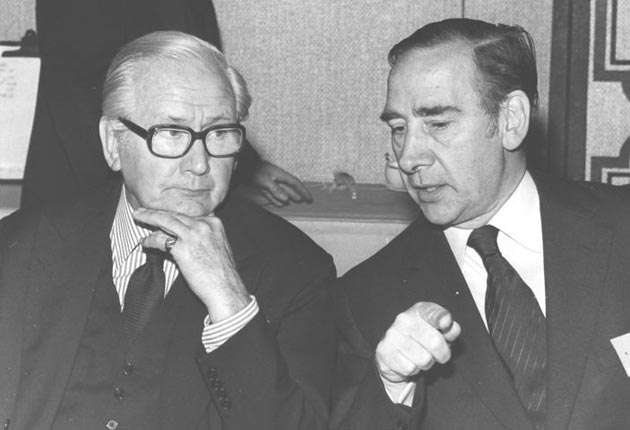William Clarke: Writer who helped transform financial journalism and was first to stress the importance of 'invisible' exports

Bill Clarke was a key member of a tiny group of financial journalists who in the 1950s and 1960s transformed the craft.
As City Editor and then Financial and Industrial Editor of The Times from 1957 to 1966 he lifted this branch of journalism from a narrow focus on the stock market into the wider coverage of all aspects of the world economy, a reshaping of the nature of financial journalism into the form it retains today. He was also the person who almost single-handedly explained to the country the importance of "invisible" exports – exports of services – as opposed to exports of physical goods. It is a task that arguably needs to be done again, for not many people seem to be aware that Britain remains the world's second largest exporter of services, after the US, whereas it is now only the sixth or seventh largest exporter of physical goods.
William M Clarke was born to a modest Lancashire family, was educated at grammar school and then started his studies of history at Manchester University. The war intervened and he joined the university air squadron and then the Royal Air Force, serving mostly in western Canada as a flying instructor. It is extraordinary now to think that he would have been a 21-year-old, teaching even younger pilots. After the war he returned to Manchester University, switch to reading economics, graduating in 1948.
He then began his career as a financial journalist, starting at the London office of the Manchester Guardian, working with Richard Fry, the City Editor. He moved to The Times in 1956, becoming City Editor the following year. There he started, among other things, the Times 1,000 list of British companies and is credited with the first reference in print of the word "Eurodollar". In 1958 he wrote a little paper giving the first estimate of Britain's invisible earnings, the issue that helped shape the second half of his career.
During the 1950s through to the 1970s there was an obsession with Britain's trade position. The monthly trade figures were big news and they were usually in deficit. The fact that there was a large surplus in services that offset this deficit was barely reported. The Bank of England and other City institutions set about trying to change this perception, creating the Committee on Invisible Exports. Bill Clarke left The Times, keeping a place in financial journalism as editor of the magazine The Banker, to become the Committee's director of studies and then its director-general. Changes that have carried on to this day, such as reporting the monthly current account statistics (i.e. including trade in services) rather than just the trade figures, stem from that initiative.
Bill Clarke also held a number of City appointments, most notably with Grindlays Bank and ANZ Grindlays – he was chairman of ANZ's merchant banking arm. But his main role in finance was as a writer. A series of books, The City in the World Economy, The World's Money, Inside the City and How the City of London Works, introduced many would-be bankers and brokers to the place in which they would make their careers.
In retirement, or what passes for that as a writer, he continued topublish and with a new twist. In 1973 his first marriage to Margaret Braithwaite, with whom he had two daughters, was dissolved and he married Faith Dawson, the great-granddaughter of Wilkie Collins. He spent some years digging into the life of thenovelist and The Secret Life of Wilkie Collins was the result. His next book, The Lost Fortune of the Tsars, sold well and was translated into a numberof languages. The research on that area led to his final work, published in 2009 when he was 86, The Hidden Treasures of the Romanovs: Saving the Royal Jewels.
His charitable interests included being a governor of Great Ormond Street Hospital and he was chairman in 1987 of its Wishing Well Appeal, which raised more than £54m, the largest "one off" charitable appeal in the UK. He was also a founding trustee and for many years chairman of the Wincott Foundation, which recognises and supports excellence in financial journalism.
Those of us who have learnt the craft of financial journalism from Bill Clarke would say that his greatest contribution both to journalism and to the City was as a teacher. He explained the City to the world. He taught a whole generation of financial journalists how to sustain an argument, what mattered and what didn't, whose judgement to trust – and how to make it clear to a reader when you didn't trust what the chairman of this or that company was telling the world.
My own debt to him, aside from his giving me my first job in financial journalism at The Banker, was in teaching me how to write for that most interesting and challenging reader: the intelligent non-specialist. Bill believed passionately that the great issues in finance and economics could be explained simply and clearly to anyone interested in the subject. He spent his life doing that. If ever there was a time when we need a clear, non-politicised explanation of what is going on, now must surely be it.
William Malpas Clarke, journalist and historian: born Ashton-under-Lyne 5 June 1922; Manchester Guardian 1948-56, The Times 1956-66 (City Editor 1957-62, Financial and Industrial Editor 1962-66), The Banker 1966-76; CBE 1976; married 1946 Margaret Braithwaite (marriage dissolved; two daughters), 1973 Faith Dawson; died London 23 April 2011.
Subscribe to Independent Premium to bookmark this article
Want to bookmark your favourite articles and stories to read or reference later? Start your Independent Premium subscription today.

Join our commenting forum
Join thought-provoking conversations, follow other Independent readers and see their replies